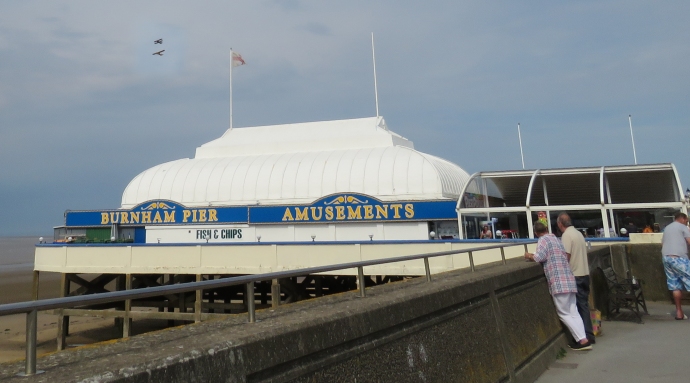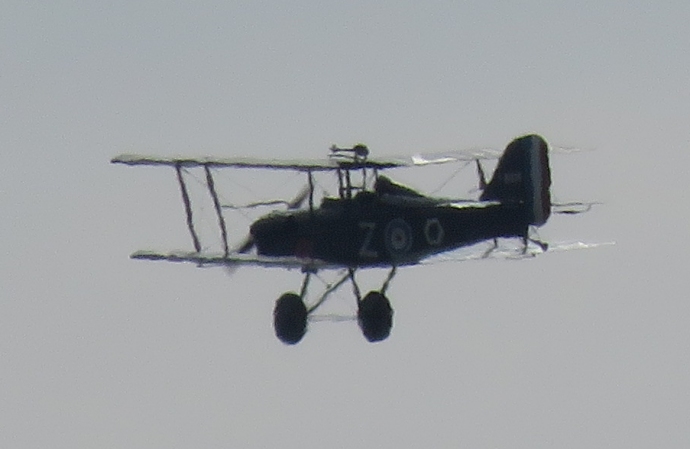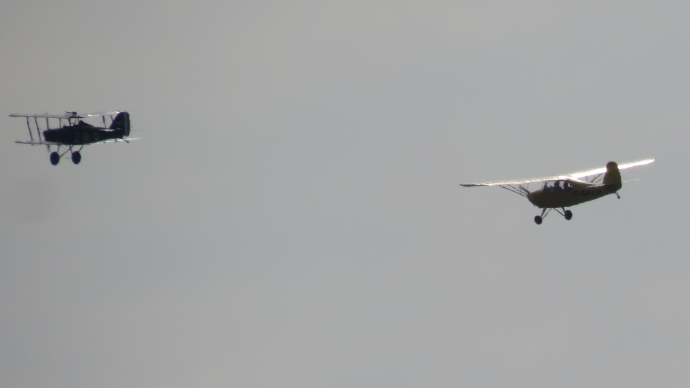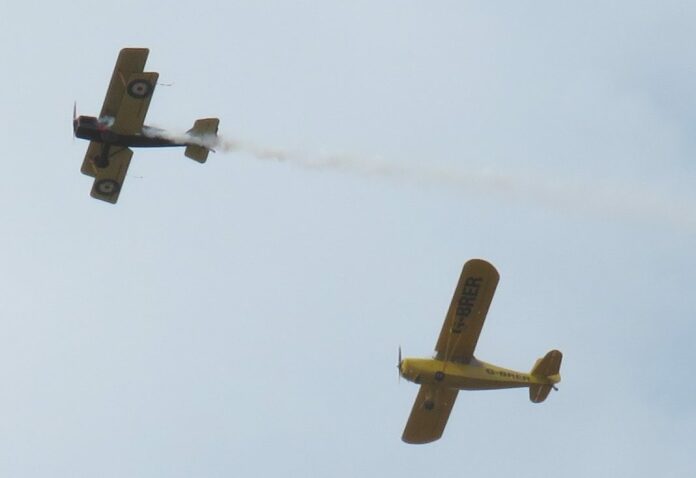The 80th anniversary of the Battle of Britain was marked on Tuesday (15th September) with a special fly-past over Burnham-On-Sea by two retired RAF pilots.
Squadron Leader Dave Linney AFC RAF Retd (an ex Harrier fighter pilot) flew a replica SE5A WW1 fighter accompanied by Flight Lieutenant Mike Laundy CFS RAF Retd (ex Victor B2 bomber pilot) flying a 1946 vintage Aeronca Champion.
The hour-long formation departed Middlezoy Aerodrome then headed over Puriton, Mark, Blackford, Wedmore, Cheddar reservoir, Winscombe, Weston Pier, Burnham-On-Sea Pavilion, Highbridge, Bason Bridge, Glastonbury Tor, Street, Somerton, Pitney and Othery before returning to Middlezoy. The fly-past was only announced a short time before it took place.

Mike explained why they did it: “The Battle of Britain is slipping into the depths of history, as are other major battles of WW2. There are few people still alive who witnessed it, and fewer still who participated in it. As battles go, the casualties amongst the combatants were relatively small compared with other battles, so why was it so important?”
“In the Summer of 1940 Britain stood alone in Europe facing the military might of Nazi Germany. In the West, France, Belgium Holland Denmark and Norway had all been defeated and occupied by the German army.”
“The British Expeditionary force had been driven back to the sea at Dunkirk and an amazing rescue by the bravery of the Royal Navy and a fleet of small civilian ships had rescued over 300,000 men, but their equipment and arms had been left behind. Had the Germans invaded Britain it is unlikely that the army denuded of equipment and guns would have repulsed them.”
“If Britain had been defeated there would have been no base from which to attack the Germans from the West, the Germans would then have had greater strength for their next campaign attacking the Soviet Union. All of Western Europe including Britain would be subjected to the tyranny of the perverted and exceedingly cruel Nazi philosophy and especially their actions to achieve so called racial purity! If that had happened the effects could well have been still with us today!”

“The Germans had a powerful well armed confident army who just needed to cross the 20 miles of English Channel. They had a large well equipped and battle hardened air force, and a navy, although outmatched by the RN, was never the less capable of doing considerable damage with its submarines and Capital ships.”
“The only British forces that had a realistic chance of stopping an invasion and the defeat of Britain were the Royal Navy and the Royal Air Force. However, to achieve a successful Channel crossing the Germans needed total air superiority over the English Channel. Without air superiority there was no guarantee of holding off the RN from devastating the invasion force at sea, and protecting it from air attack by the RAF. To achieve air superiority the RAF and specifically Fighter Command of the RAF had to be defeated. The German Air Force the Luftwaffe needed to achieve a kill ratio of 5:1. ”
“In the great air battles over Southern England during the Summer of 1940 despite being greatly superior in numbers the Luftwaffe were unable to achieve the destruction of the RAF as an effective fighting force. During the battle 2917 fighter pilots took part on the British side, they were the “few” referred to by Prime Minister Winston Churchill when he told the House of Commons that “Never in the field of human conflict was so much owed by so many to so few”. The pilots were mostly British but some came from the defeated countries of Europe as well as the British Empire, and even a few Americans (who were supposed to be neutral but in the main pretended to be Canadian)!”
“The Battle effectively ended in the Autumn of 1940 when weather conditions in the Channel were against a realistic crossing by the Germans. The Luftwaffe had lost 2689 aircrew the RAF had lost 1023 fighter aircraft and 544 pilots, the other RAF commands had lost around 800 aircrew mainly from Bomber command attacking the invasion forces massing on the French coast. In aircraft numbers due to the efficiency of the British aircraft industry, Fighter command had more Hurricanes and Spitfires at the end of the battle than at the start whereas the German aviation industry failed to keep pace with the Luftwaffe losses. Also important was the huge loss of experienced Luftwaffe aircrew, it was something the Luftwaffe never fully recovered from.”

“The Luftwaffe was not defeated in the sense they were still able to mount devastating night raids over British cities (known as the Blitz), and occasional daylight hit and run missions but they lost from the strategic point of view in that they never achieved the air superiority necessary for a successful invasion. The real heroes from the British point of view were the fighter pilots of the RAF. Day after day in that summer 80 years ago those young men average age 22 gave their all, often flying several times a day, with 1 or 2 squadrons totalling no more than around 12 aircraft per squadron facing an enemy that could easily out number them 10 to 1. The stress and battle fatigue was enormous with friends around them being killed or maimed, frequently by fire, on a daily basis. Yet they still fought on. Their tenacity and heroism allowed Britain to remain free and provide the base for the successful invasion of Europe together with out American allies 4 years later and so to the defeat of the Nazi evil.”
“Even now 80 years later we owe a debt of gratitude to the “Few”. September 15th is commemorated as Battle of Britain day, since on that day in 1940 the greatest of all the air battles took place when the Luftwaffe lost over 150 aircraft against around 50 lost by the RAF.”







